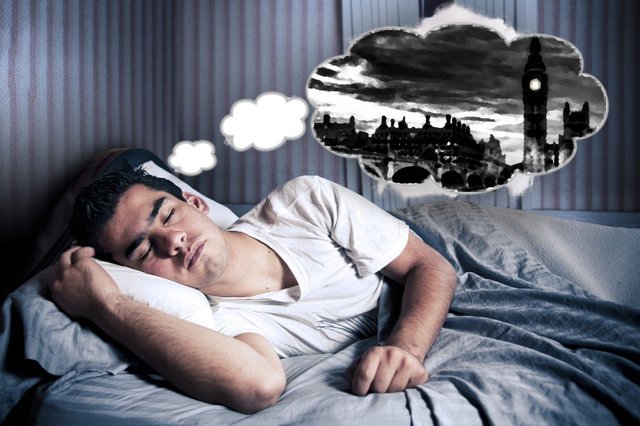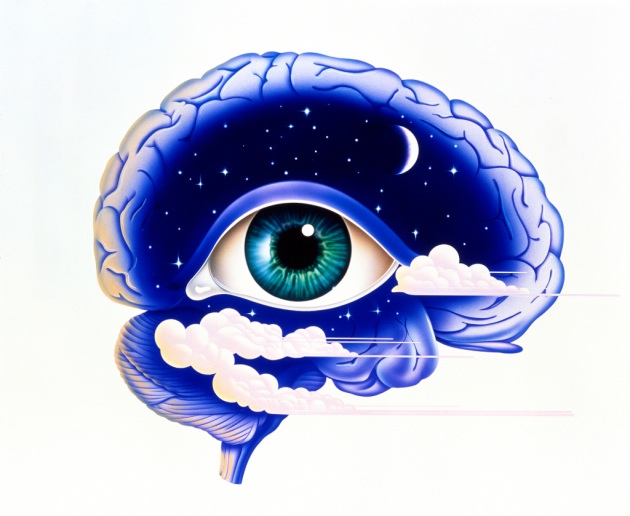Scientific view about Dream in relation to Sleep
What are dreams ? Why do we dream? psychologists and neurologists have elaborated different theories that explain the origin and purpose of the dream activity: according to some, they help us to consolidate the memories, according to others they are essential to elaborate emotions and fears.

But in the last decades a series of studies and experiments brought to the fore, at least in part, the conclusions reached by Sigmund Freud between the end of the nineteenth century and the beginning of the 20th century, which were then set aside during the 20th century. in the light of new research: according to these theories dreams would be thoughts that our subconscious seeks to ignore during the day and which return to the surface at night.

ERASE THOUGHTS
The first of these studies dates back to 2004 and was conducted at Harvard by Daniel Wegner , who had noted how a thought that we forcibly seek to ignore continues to surface in our mind.
According to Wegner this phenomenon is the result of two opposite and contemporary brain processes: one that actively tries to suppress thought or memory and the other that checks the state of repression. Deleting a thought is a complex process and can only take place when these two mechanisms work together and in harmony.
Wegner hypothesizes that these processes may not work properly during the REM phase of sleep, because in those moments the parts of the brain involved in the suppression of memories are deactivated. And since most dreams occur at this stage, Wegner speculates that they originated from thoughts whose suppression failed.
TEST
The scientist tested this theory with the help of some volunteers. He asked the participants to choose a person among their knowledge and to dedicate 5 minutes, before going to bed, to write thoughts. Some have been told to write without thinking of a chosen person in anyway, while others have been asked to keep it at the center of the elaboration. No indication was given to a control group.
The next morning everyone was asked to record in writing the dreams of the night they could remember. The result was striking: the volunteers who had been explicitly told to suppress thinking about their acquaintance dreamed that person far more than anyone else.
BAD THOUGHTS & BAD DREAMS
In recent years these theories have been further explored and today we know that this sort of "rebound effect" of dreams is much more common in people more inclined to suppress thoughts. And in these people dreams related to the thoughts that they want to eliminate tend to take on darker colors.
Among other things, this process seems linked to a worse quality of sleep, high levels of stress, anxiety and depression.
SIGMUND FREUD WAS RIGHT
The analysis of dreams can therefore be an excellent indicator of what causes us problems in real life but of which we tend not to have the perception. Thus Freud's theories seem to be partly confirmed.
Just as it has been experimentally verified that in the REM phase of sleep dreams are full of aggressive interactions, which Freud had explained as repressed impulses during the day.
Obviously not all the theories of Freud can be experimentally tested, but it seems confirmed that dreams are a privileged way to access our unconsciousness.

WHAT OUR BRAIN DO DURING THIS TIME
During sleep the brain rests, but not completely and not always in the same way in different phases. In some moments we are able to hear and categorize sounds.
According to a study just published in the Journal of Neuroscience in some stages of sleep, even if we do not realize it, we are able to analyze complex sound stimuli, and prepare ourselves to act accordingly.
SELECTION AT THE ENTRANCE
During sleep, the brain isolates us from external stimuli thanks to a control mechanism at the level of the thalamus (a structure of the central nervous system ). But some types of recalls, like the sound of our name seem to be able to cross this filter, wake up!!! . How this "gate" works, which blocks some stimuli but lets others pass, is not yet fully known.
DREAM FOR SCIENCE
Thomas Andrillon, neuroscientist of the École normale supérieure in Paris, note the discriminating element could be the stage of sleep in which one finds oneself.The researcher invited some volunteers to spend the night in the laboratory. As they fell asleep, he invited them to listen to some words, and to press a button with their left hand if they had heard the name of objects, and with the right in the case of words indicating animals. Their brain activity was monitored by electroencephalography (EEG).
DIFFERENT REACTIONS
The type of response has changed based on the stage of sleep in which the subjects were. During REM sleep - the phase in which we usually dream - the volunteers continued to mentally prepare the movements to crush the buttons, but only in the case of words met and previously categorized.
During the light phases of non - REM sleep, the participants have always shown motor preparation, regardless of the novelty or not of the words; in the non-REM deep sleep phase, on the other hand, there was no brain activity associated with the stimuli.
For researchers, in REM the external stimuli risk competing with those related to dreams, generated internally; for this reason, surprisingly, they are partly shielded. In deep sleep, however, brain waves are hypersynchronized and thousands of neurons "silencing" in unison, preventing the brain from processing sensory information.
DREAM OR AM I AWAKE?
On the contrary, in the light phase of non-REM sleep a complex analysis of external stimuli seems possible, even if apparently we are sleeping. Moreover, a recent study had highlighted how, when we sleep in an unknown environment, a part of our brain remains vigilant , to control the situation.
A well researched post
Very interest post
Congratulations @afifa! You have completed some achievement on Steemit and have been rewarded with new badge(s) :
Click on any badge to view your own Board of Honor on SteemitBoard.
For more information about SteemitBoard, click here
If you no longer want to receive notifications, reply to this comment with the word
STOP